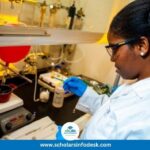Studying a research program at the University of Saskatchewan in Canada offers a multitude of advantages. Firstly, the university boasts a strong reputation for its research-intensive environment, providing students with ample opportunities to engage in cutting-edge research projects and contribute to their respective fields. Additionally, the university offers state-of-the-art facilities and resources, enabling students to conduct their research effectively. Moreover, the University of Saskatchewan attracts renowned faculty members who are experts in their fields, offering invaluable guidance and mentorship to aspiring researchers. Lastly, studying at the University of Saskatchewan provides a vibrant and inclusive community, fostering interdisciplinary collaboration and networking opportunities. Overall, pursuing a research program at the University of Saskatchewan equips students with the necessary skills, knowledge, and support to excel in their chosen research area and make meaningful contributions to their respective fields.
Join our community to have access to latest scholarship and study abroad information. Join Now.
About The University of Saskatchewan
The University of Saskatchewan (USask) is one of the top research-intensive, medical doctoral universities in Canada, and is home to world-leading research in areas of global importance, such as water and food security and infectious diseases. Guided by its University Plan: The University the World Needs, they work together across disciplines and with their communities to find creative solutions to the most pressing global challenges. Their graduates, recognized for their strong work ethic, resourceful nature, and determination, are leading change here at home and around the world. These are a few of the reasons why you should consider studying in USask. Wouldn’t you want to belong to this tradition of impacts? Why study in USask? Why Study in Canada
Strongly recommended for you:
About the Masters & PhD Food Science Scholarship in Canada
Saskatchewan is known as the bread basket of Canada, referring to its strength as a primary producer of agricultural commodities and its contributions to agro-biological science and biotechnology. These areas extend the scope of agriculture to food and bioproducts. The Food and Bioproducts Sciences Department has two streams of research: food science and applied microbiology. Food Science applies principles from chemistry, biology, microbiology and engineering to the study of food and the development of food technology and to non-food uses of agricultural materials.
Research Fields For the Food Science Masters & PhD Scholarships in Canada
The masters and PhD scholarship program at the University of Saskatchewan Canada, have the following faculties with interests on:
-
-
- Value-added crop utilization
- Novel techniques to detect food adulteration
- Lipid quality and utilization
- Food nanotechnology
- Food enzymology
- Meat quality
- Microbial bioproducts
- Lipid biotechnology
- Food and environmental microbiology
- Protein quality and utilization
- Mycology, microbial biotechnology and bioproducts.
-
The Department of Food and Bioproducts is housed in the state-of-the-art College of Agriculture building, a prominent edifice on the beautiful USask campus. This research-driven unit focuses on small class size, ready access to and help from faculty supervisors, and hands-on experiential training in numerous high-caliber facilities, including food and bioproduct chemistry and analysis laboratories; food microbiology laboratories; molecular and environmental microbiology laboratories; product development and sensory evaluation laboratories; biotechnology research facilities; and food and bioproduct processing facilities.
Scholarships For the Food Science Masters & PhD In Canada
Students accepted into the M.Sc. and Ph.D. of the food science programs receive financial support from their supervisor’s research funds. Students are also able to apply for academic awards and funds to support the student experience.
All students registered in thesis-based graduate programs within departments in the College of Agriculture and Bioresources receive a minimum level of funding at the beginning of their programs. Students are also eligible to receive other funding (e.g. scholarships and employment) in addition to these levels.
The minimum funding levels are as follows:
The minimum level of financial support for students in a thesis-based Master’s program
Two years of funding at $18,500/year
The minimum level of financial support for students in a Doctoral program
Three years of funding at $22,000/year
Admission Requirement For The Food Science Masters & PhD Scholarships
Master of Science
- A cumulative weighted average of at least a 70% (USask grade system equivalent) in the last two years of study (e.g. 60 credit units)
- Language Proficiency Requirements: Proof of English proficiency may be required for international applicants and for applicants whose first language is not English
- A four-year honours degree, or equivalent, from a recognized college or university in an academic discipline relevant to the proposed field of study
PhD Direct Entry
- With the recommendation of the unit, direct entry Ph.D. admission is available to exceptionally strong students, who show great promise in terms of academic accomplishments and potential for research.
- Language Proficiency Requirements:Proof of English proficiency may be required for international applicants and for applicants whose first language is not English
- A cumulative weighted average of at least a 80% (USask grade system equivalent) in the last two years of full-time undergraduate study (i.e. 60 credit units of course work)
- A four-year honours, or equivalent, from a recognized university in a relevant academic discipline in academic discipline relevant to the proposed field of study
PhD Non-directly entry
- Language Proficiency Requirements: Proof of English proficiency may be required for international applicants and for applicants whose first language is not English.
- Master’s degree, or equivalent, from a recognized university in a relevant academic discipline
- A cumulative weighted average of at least a 70% (USask grade system equivalent) in the last two years of full-time study (i.e. coursework required for master’s program)
Application Process For The Food Science Masters & PhD Scholarship Program
Find a supervisor
Find a potential supervisor, read about the work they are currently doing and their past publications. If you think you’d like to work with them, contact them and describe your research interests and past academic experience. If they are accepting students, they will instruct you to begin a formal application. See the practical guide to getting a supervisor. Here is a list of potential supervisors:
-
-
-
- Bishnu Acharya:Field: Cellulose-based biomaterials, biochemicals and nanocomposites; Thermochemical and biochemical conversion technologies
- Yongfeng Ai:Field: Carbohydrate quality and utilization, dietary fiber, crop quality and processing.
- Christopher Eskiw:Field: Nutrigenomics, Molecular Geontology, Genome Organization
- Supratim Ghosh:
-
-
-
-
-
- Field: Food Nanotechnology
- Darren Korber:
- Field: Metagenomics and proteomics of biofilm communities in dense clays, microbial stress response and antimicrobial resistance, encapsulated probiotics
- Field: Protein quality and utilization
- Field: Molecular biology and biotechnology of nutraceuticals, bioactive lipids and industrial biochemicals.
-
-
-
-
- Field: Enzyme structure-function relationship studies, Enzyme utilization in food and bioproduct processing
- Field: Enzyme structure-function relationship studies, Enzyme utilization in food and bioproduct processing
-
Field: Molecular Mycology and Biotechnology, Microbiome and Endosymbionts, Biocontrol, Mycotoxins
Submit an online application
Before beginning your online application, be sure that you have carefully reviewed all program information and admission requirements on this page.
During the application, you’ll be asked for:
- Personal information such as your name, address, etc.
- Contact information of your three referees
For your letters of recommendation, two of your referees must be academic contacts, and the third may be academic or professional
- Your complete academic history from all previous post-secondary institutions
The application takes about 30 minutes to complete. You may save your application and return to it later. At the end of the application, you will need to pay a non-refundable $120 application fee. Your application will not be processed until payment is received.
The application is on a rolling basis, therefore there is no deadline.
For more details, visit the official website of USask


